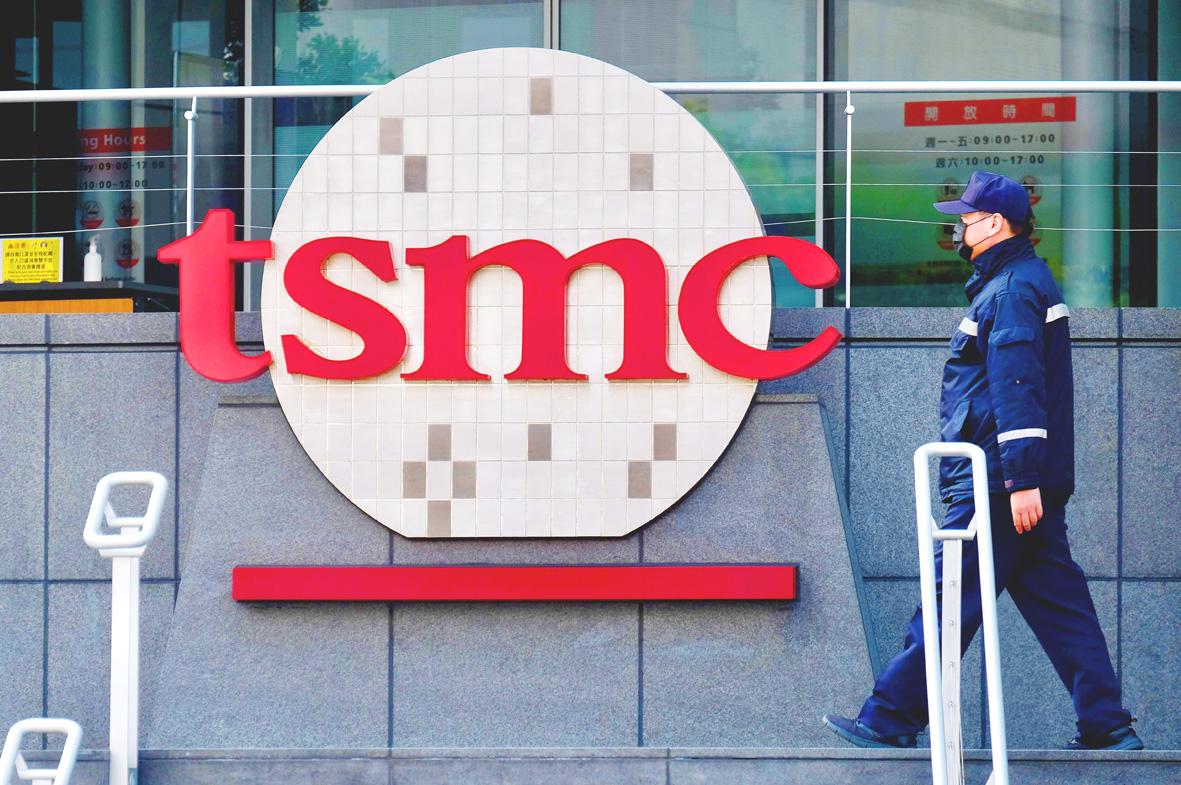Taiwan Semiconductor Manufacturing Co’s (TSMC, 台積電) largest customer accounted for 25 percent of its total revenue last year. Analysts believe the unnamed company to be Apple Inc.
The world’s largest contract chipmaker generated NT$336.78 billion (US$11.9 billion) in consolidated sales from its largest customer last year, accounting for about 25 percent of the total, financial data provided by TSMC showed.
With TSMC believed to be the sole processor supplier for Apple’s iPhone 12, analysts said the largest customer is likely the US consumer electronics giant, which drove the chipmaker’s sales growth.

Photo: Sam Yeh, AFP
TSMC did not identify the customer.
TSMC last year posted consolidated sales of NT$1.339 trillion, a historic high and up 25.17 percent from a year earlier on the back of strong global demand for smartphones, high-performance computing devices and Internet of Things products.
TSMC said that revenue generated from its largest customer rose 36.22 percent from a year earlier, meaning its sales to the customer rose from 23 percent to 25 percent of its total sales.
As Apple is keen to unveil processors it designed itself using TSMC’s high-end technologies, analysts said that the chipmaker is expected to see sales to the US customer grow.
TSMC said it last year generated consolidated sales of NT$167.39 billion from its second-largest customer, up 9.49 percent from a year earlier.
While TSMC again did not identify the customer, which accounted for 12 percent of total sales, down from 14 percent in 2019, analysts said that the company is likely Huawei Technologies Co (華為).
Due to tensions between the US and China, Washington imposed sanctions on the Chinese smartphone company on Sept. 15 last year. TSMC stopped shipments to Huawei on Sept. 14.
However, the void left by Huawei has been quickly filled by other customers, TSMC said.
Last year, TSMC generated NT$817.91 billion in sales to the US, which accounted for 61.07 percent of its total sales, making it the largest market for the company’s products.
TSMC posted sales of NT$233.78 billion, or 17.45 percent of its total sales, to China, the second-largest market, which was followed by Taiwan, where the chipmaker generated sales of NT$129.08 billion, or 9.63 percent of its total.

South Korea’s equity benchmark yesterday crossed a new milestone just a month after surpassing the once-unthinkable 5,000 mark as surging global memory demand powers the country’s biggest chipmakers. The KOSPI advanced as much as 2.6 percent to a record 6,123, with Samsung Electronics Co and SK Hynix Inc each gaining more than 2 percent. With the benchmark now up 45 percent this year, South Korea’s stock market capitalization has also moved past France’s, following last month’s overtaking of Germany’s. Long overlooked by foreign funds, despite being undervalued, South Korean stocks have now emerged as clear winners in the global market. The so-called “artificial intelligence

‘SEISMIC SHIFT’: The researcher forecast there would be about 1.1 billion mobile shipments this year, down from 1.26 billion the prior year and erasing years of gains The global smartphone market is expected to contract 12.9 percent this year due to the unprecedented memorychip shortage, marking “a crisis like no other,” researcher International Data Corp (IDC) said. The new forecast, a dramatic revision down from earlier estimates, gives the latest accounting of the ongoing memory crunch that is affecting every corner of the electronics industry. The demand for advanced memory to power artificial intelligence (AI) tasks has drained global supply until well into next year and jeopardizes the business model of many smartphone makers. IDC forecast about 1.1 billion mobile shipments this year, down from 1.26 billion the prior

People stand in a Pokemon store in Tokyo on Thursday. One of the world highest-grossing franchises is celebrated its 30th anniversary yesterday.

NEW IDENTITY: Known for its software, India has expanded into hardware, with its semiconductor industry growing from US$38bn in 2023 to US$45bn to US$50bn India on Saturday inaugurated its first semiconductor assembly and test facility, a milestone in the government’s push to reduce dependence on foreign chipmakers and stake a claim in a sector dominated by China. Indian Prime Minister Narendra Modi opened US firm Micron Technology Inc’s semiconductor assembly, test and packaging unit in his home state of Gujarat, hailing the “dawn of a new era” for India’s technology ambitions. “When young Indians look back in the future, they will see this decade as the turning point in our tech future,” Modi told the event, which was broadcast on his YouTube channel. The plant would convert